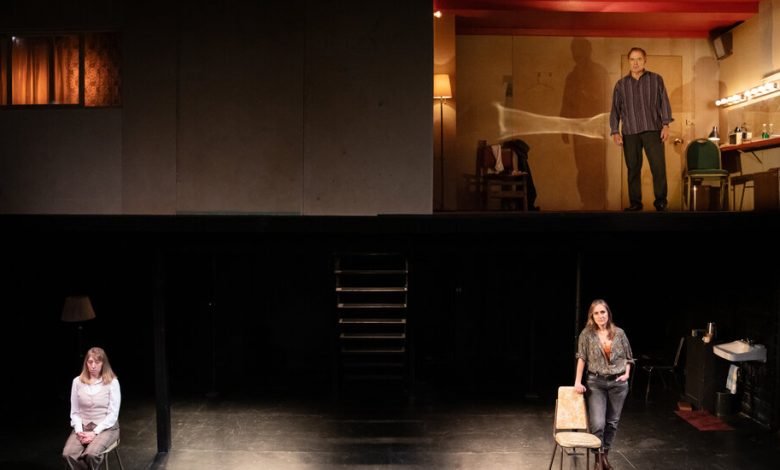‘Munich Medea: Happy Family’ Review: A Friendship Crushed by the Past

“Munich Medea: Happy Family” carries the wrong trigger warning. Rather than cautioning us that Corinne Jaber’s debut play “addresses, but does not depict, sexual assault,” it should warn us that its tropes will be ploddingly predictable to just about anyone who has seen the #MeToo movement play out in recent years.
On opposite sides of a sparsely furnished split-level stage, two women, Caroline and Alice, tell us about the dissolution of their childhood friendship after they were sexually abused by the same man. While the script seems to be pitched somewhere between a memory play and an exorcism, what unfolds onstage, under the director Lee Sunday Evans’s light touch, is as dry and sober as a deposition — with its mentions of consent (uttered 10 times in the play’s 75 minutes), forensic descriptions of rape and clockwork-like moments of catharsis. For a play named after a legendarily vengeful Greek mother, “Munich Medea” (a co-production of PlayCo and WP Theater) is a strikingly domesticated and becalmed production.
This is not to say that mothers come off entirely well in this play. At one point, Caroline (a granite-faced Crystal Finn) — looking back on the abuse that her father (a louche Kurt Rhoads) inflicted on her best friend, Alice (Heather Raffo) — reflects that “none of this would’ve happened” without her mother’s consent, “which she gave, always, willingly and silently.” Her mother never materializes in the play. That the mother is effectively silenced could be a way for her daughter to exact poetic revenge, by silencing the person who wove a conspiracy of silence around her husband’s crimes. But the play is not wily enough to ambush the accomplice in her own trap.
Alice’s own mother, a refugee from East Germany, is also conspicuously absent. A more sympathetic character, she’s described as a “virtuous, well-behaved Protestant” who once confronted Caroline’s father, asking him to leave her daughter alone, to no avail. As played by Rhoads, the father (he is given no proper name) is a silver-tongued theater actor who spends much of the play in his dressing room, elevated about 10 feet above the floor. Lines from Friedrich Schiller rain down on us from his lair, and even in old age, he has no trouble quoting Georg Büchner and Rainer Maria Rilke from memory. As with Vladimir Nabokov’s infamous pedophile, Humbert Humbert, the father in “Munich Medea” seems to believe that aesthetic ingenuity more than makes up for ethical lapses.
We are having trouble retrieving the article content.
Please enable JavaScript in your browser settings.
Thank you for your patience while we verify access. If you are in Reader mode please exit and log into your Times account, or subscribe for all of The Times.
Thank you for your patience while we verify access.
Already a subscriber? Log in.
Want all of The Times? Subscribe.